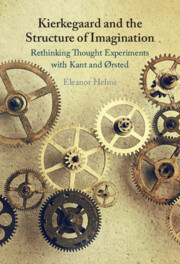Book contents
- Kierkegaard and the Structure of Imagination
- Kierkegaard and the Structure of Imagination
- Copyright page
- Contents
- Acknowledgments
- Abbreviations
- Introduction
- Part I The Origins of “Thought Experiment” in Kant and Ørsted
- Chapter 1 Thought Experiments as Tools of Cognition
- Chapter 2 How Thought Experiments Work
- Chapter 3 Ørsted, Mach, and the History of Thought Experiment
- Chapter 4 Empiricism and Kantian Accounts of Thought Experiment
- Chapter 5 Rationalism and the Question of Intellectual Intuition
- Part II A Kantian Account of Thought Experiment
- Part III Kierkegaard and the Concept of Thought Experiment
- Conclusion
- Bibliography
- Index
Chapter 5 - Rationalism and the Question of Intellectual Intuition
from Part I - The Origins of “Thought Experiment” in Kant and Ørsted
Published online by Cambridge University Press: 26 September 2025
- Kierkegaard and the Structure of Imagination
- Kierkegaard and the Structure of Imagination
- Copyright page
- Contents
- Acknowledgments
- Abbreviations
- Introduction
- Part I The Origins of “Thought Experiment” in Kant and Ørsted
- Chapter 1 Thought Experiments as Tools of Cognition
- Chapter 2 How Thought Experiments Work
- Chapter 3 Ørsted, Mach, and the History of Thought Experiment
- Chapter 4 Empiricism and Kantian Accounts of Thought Experiment
- Chapter 5 Rationalism and the Question of Intellectual Intuition
- Part II A Kantian Account of Thought Experiment
- Part III Kierkegaard and the Concept of Thought Experiment
- Conclusion
- Bibliography
- Index
Summary
Rationalist accounts of thought experiment in epistemology offer an alternative to the more predominantly empiricist approaches in philosophy of science. In this chapter, I will pose a Kantian critique of recent rationalist accounts of intellectual intuition. Some epistemologists have recently argued that intellectual intuitions can provide prima facie justification for judgments. In this chapter, I highlight some promising elements of recent rationalist accounts, especially the proposal that there can be nonsensory presentations analogous to empirical perceptions. If they are right, then thought experiments can provide new experiential content even without empirical confirmation. However, I also draw attention to Kant’s objections to the possibility of purely intellectual intuitions.
Information
- Type
- Chapter
- Information
- Kierkegaard and the Structure of ImaginationRethinking Thought Experiments with Kant and Ørsted, pp. 76 - 86Publisher: Cambridge University PressPrint publication year: 2025
Accessibility standard: Inaccessible, or known limited accessibility
Why this information is here
This section outlines the accessibility features of this content - including support for screen readers, full keyboard navigation and high-contrast display options. This may not be relevant for you.Accessibility Information
Content Navigation
Allows you to navigate directly to chapters, sections, or non‐text items through a linked table of contents, reducing the need for extensive scrolling.
Provides an interactive index, letting you go straight to where a term or subject appears in the text without manual searching.
Reading Order & Textual Equivalents
You will encounter all content (including footnotes, captions, etc.) in a clear, sequential flow, making it easier to follow with assistive tools like screen readers.
You get more than just short alt text: you have comprehensive text equivalents, transcripts, captions, or audio descriptions for substantial non‐text content, which is especially helpful for complex visuals or multimedia.
Visual Accessibility
You will still understand key ideas or prompts without relying solely on colour, which is especially helpful if you have colour vision deficiencies.
You benefit from high‐contrast text, which improves legibility if you have low vision or if you are reading in less‐than‐ideal lighting conditions.
